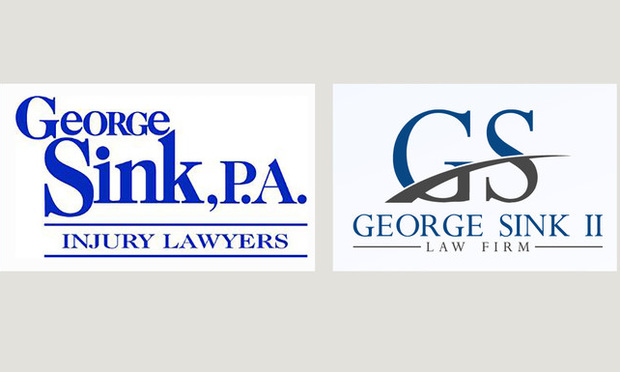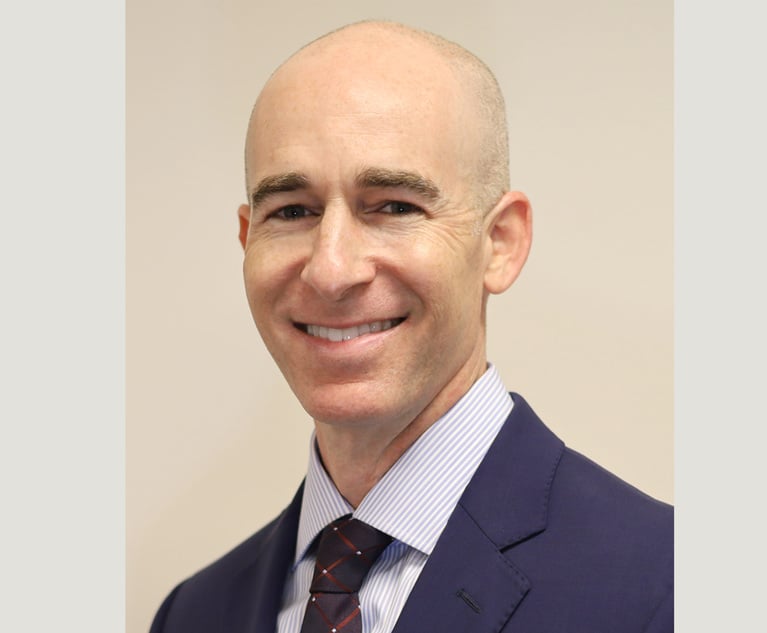Sink Sr. v. Sink Jr.: Namesake Son Fires Back at Dad's Suit Over Firm Names
A trademark dispute between the two lawyers in South Carolina federal court has become even more acrimonious in the last few days.
May 31, 2019 at 05:45 PM
5 minute read
 Logos of George Sink, P.A., of George Sink and George Sink ll Law Firm of George Sink Jr.
Logos of George Sink, P.A., of George Sink and George Sink ll Law Firm of George Sink Jr.
Johnny Cash's famous song “A Boy Named Sue” ends with the singer vowing to name his own son George. But Charleston plaintiffs lawyer George Sink Sr. seems to regret doing just that—and now his son, George Sink Jr., is firing back.
A trademark dispute between the two lawyers in South Carolina federal court has become even more acrimonious in the last few days, with Sink Jr. claiming his father is responsible for any market confusion he now blames on his son.
Sink Sr. “has declared war on his son,” said Sink Jr. in May 29 court documents. “Senior has failed to be faithful to his own flesh and blood.”
Sink Sr. sued Sink Jr., also a Charleston plaintiffs lawyer, earlier this year to prevent his son from using George Sink II Law Firm as the name of his new shop. Sink Jr. opened his firm in February, a few days after his father's firm fired him.
Sink Sr. claims his son is violating the trademark Sink Sr. holds for his own 22-year-old firm, George Sink, P.A. Injury Lawyers. In court documents, Sink Sr. refers to his son by his son's nickname, Ted. (Both lawyers' middle name is Theodore.)
But Sink Jr.'s May 29 response, opposing his father's preliminary injunction motion, contends that his father cannot prevent him from using his legal name for his own law firm—and it tells a very different story about their falling out.
According to his filing, the younger Sink spent the first 11 years of his career working in marketing in New York for McGarryBowen, BBDO and other firms, but then in 2013 returned to Charleston at his father's request.
His father had started thinking about retirement and offered to pay him to attend law school with the plan of ultimately transitioning the firm over to him, Sink Jr. said. (Over the years George Sink, P.A. Injury Lawyers has grown to 45 lawyers in 14 offices, according to its website.)
Sink Jr. agreed and “excitedly returned home in reliance on the promises made by his father,” according to his filing. He enrolled at the Charleston School of Law, and, during law school, he worked in the marketing department at George Sink, P.A., Injury Lawyers.
The firm advertises heavily on TV, radio, social media and via its website, sinklaw.com, according to Sink Sr.'s complaint, which also asked for the surrender of Sink Jr.'s website domain name, GeorgeSinkLawFirm.com.
After Sink Jr. was admitted to the South Carolina Bar in November 2016, he said, he became an associate at his father's firm while continuing to assist with marketing.
At that time, Sink Jr. claims, his father actively promoted him as “George Sink Jr.”—and not by Ted, his nickname—in TV advertising for the law firm, and on its letterhead and business cards. “That is, the plaintiff wanted George Jr. to be identified as attorney George Sink, until it became inconvenient to have two George Sink attorneys in the world.”
That happened, Sink Jr. alleges, when George Sink, P.A. Injury Lawyers' revenue “spiked to the point that national suitors came calling.” The “suitors found it inconvenient that there was another attorney in town named George Sink,” Sink Jr. said.
That prompted Sink Sr. to ask Sink Jr. to sign a confidentiality and nonsolicitation agreement, according to Sink Jr. The younger Sink found the terms “unacceptable” and refused to sign. Sink Sr. told his son to “change the agreement to something he could sign.” Sink Jr. did so, and both signed the agreement on April 30, 2018.
What's at issue now is a dispute over what the agreement means. An arbitration clause in it says that the employer, Sink Sr., may only recover up to $500 against the employee, Sink Jr., and that they agree “that this represents full and final payment for all claims against employee now and in the future.”
Sink Sr. fired Sink Jr. on Feb. 7. Soon after, Sink Jr. started his own shop, and on March 6 he sent his father's firm a check for $500, via his lawyers at Bland Richter, “to avoid any unnecessary and frivolous legal proceedings,” according to several exhibits attached to the younger Sink's filing.
Sink Jr. contends he has as much right to be George Sink professionally as his father, including in the name of his law firm. “If there is market confusion, which the defendant rejects, the confusion was manufactured by the plaintiff,” Sink Jr. said.
What's more, Sink Jr. said, the two trademarks Sink Sr. holds are merely “design marks” for the logos for “George Sink, P.A., Injury Lawyers” and “George Sink P.A.” which Sink Jr. is not infringing with his own logo and promotional materials for George Sink II Law Firm.
His father can't trademark their shared name, Sink Jr. argues, adding that Sink Sr. does not hold a trademark for “George Sink Ubiquitous TV Face.”
Neither Sink Sr. nor attorneys he's retained from Gibbs & Holmes and Moore & Van Allen immediately responded to an emailed request for comment.
This content has been archived. It is available through our partners, LexisNexis® and Bloomberg Law.
To view this content, please continue to their sites.
Not a Lexis Subscriber?
Subscribe Now
Not a Bloomberg Law Subscriber?
Subscribe Now
NOT FOR REPRINT
© 2025 ALM Global, LLC, All Rights Reserved. Request academic re-use from www.copyright.com. All other uses, submit a request to [email protected]. For more information visit Asset & Logo Licensing.
You Might Like
View All
On The Move: Kilpatrick Adds West Coast IP Pro, Partners In Six Cities Join Nelson Mullins, Freeman Mathis
6 minute read

Trump Fires EEOC Commissioners, Kneecapping Democrat-Controlled Civil Rights Agency
Trending Stories
- 1After Botched Landing of United Airlines Boeing 767, Unlikely Plaintiff Sues Carrier
- 2DOT Moves to Roll Back Emissions Rules, Eliminate DEI Programs
- 3No Injury: Despite Proven Claims, Antitrust Suit Fails
- 4Miami-Dade Litigation Over $1.7 Million Brazilian Sugar Deal Faces Turning Point
- 5Trump Ordered by UK Court to Pay Legal Bill Within 28 Days
Who Got The Work
J. Brugh Lower of Gibbons has entered an appearance for industrial equipment supplier Devco Corporation in a pending trademark infringement lawsuit. The suit, accusing the defendant of selling knock-off Graco products, was filed Dec. 18 in New Jersey District Court by Rivkin Radler on behalf of Graco Inc. and Graco Minnesota. The case, assigned to U.S. District Judge Zahid N. Quraishi, is 3:24-cv-11294, Graco Inc. et al v. Devco Corporation.
Who Got The Work
Rebecca Maller-Stein and Kent A. Yalowitz of Arnold & Porter Kaye Scholer have entered their appearances for Hanaco Venture Capital and its executives, Lior Prosor and David Frankel, in a pending securities lawsuit. The action, filed on Dec. 24 in New York Southern District Court by Zell, Aron & Co. on behalf of Goldeneye Advisors, accuses the defendants of negligently and fraudulently managing the plaintiff's $1 million investment. The case, assigned to U.S. District Judge Vernon S. Broderick, is 1:24-cv-09918, Goldeneye Advisors, LLC v. Hanaco Venture Capital, Ltd. et al.
Who Got The Work
Attorneys from A&O Shearman has stepped in as defense counsel for Toronto-Dominion Bank and other defendants in a pending securities class action. The suit, filed Dec. 11 in New York Southern District Court by Bleichmar Fonti & Auld, accuses the defendants of concealing the bank's 'pervasive' deficiencies in regards to its compliance with the Bank Secrecy Act and the quality of its anti-money laundering controls. The case, assigned to U.S. District Judge Arun Subramanian, is 1:24-cv-09445, Gonzalez v. The Toronto-Dominion Bank et al.
Who Got The Work
Crown Castle International, a Pennsylvania company providing shared communications infrastructure, has turned to Luke D. Wolf of Gordon Rees Scully Mansukhani to fend off a pending breach-of-contract lawsuit. The court action, filed Nov. 25 in Michigan Eastern District Court by Hooper Hathaway PC on behalf of The Town Residences LLC, accuses Crown Castle of failing to transfer approximately $30,000 in utility payments from T-Mobile in breach of a roof-top lease and assignment agreement. The case, assigned to U.S. District Judge Susan K. Declercq, is 2:24-cv-13131, The Town Residences LLC v. T-Mobile US, Inc. et al.
Who Got The Work
Wilfred P. Coronato and Daniel M. Schwartz of McCarter & English have stepped in as defense counsel to Electrolux Home Products Inc. in a pending product liability lawsuit. The court action, filed Nov. 26 in New York Eastern District Court by Poulos Lopiccolo PC and Nagel Rice LLP on behalf of David Stern, alleges that the defendant's refrigerators’ drawers and shelving repeatedly break and fall apart within months after purchase. The case, assigned to U.S. District Judge Joan M. Azrack, is 2:24-cv-08204, Stern v. Electrolux Home Products, Inc.
Featured Firms
Law Offices of Gary Martin Hays & Associates, P.C.
(470) 294-1674
Law Offices of Mark E. Salomone
(857) 444-6468
Smith & Hassler
(713) 739-1250







